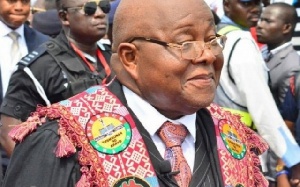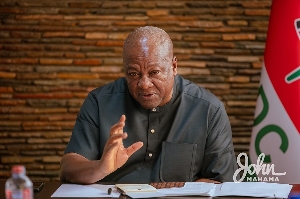Opinions of Monday, 3 June 2019
Columnist: Isaac Ato Mensah
Oh no, Mr Speaker!
Parliamentary business is properly referred to as “public business”; it goes into the public record.
It reflects how the nation thinks. Indeed, a Member can raise the subject of this article for discussion when he takes leave from the Right Honourable Speaker.
Therefore when our Speaker does not observe protocol, there are serious questions to be asked.
Last week, when tributes where being paid in Parliament to the late Dr Kwabena Adjei, a former MP, this is what Mr Speaker said as broadcast on the midday news of Adom FM 106.3 MHz, Accra on 31st May, 2019.
“Brothers and sisters, just to make my protocol short, all protocol observed…..”
What is that?
Someone observed, “That is typical Presec language”. This got me thinking about many things, because the Presecans themselves have been chest-thumping about their high numbers in our current Parliament.
But let us consider a few concerns here.
Is there any doubt that the reverend ministers (including Mr Speaker) of yesteryear were trained properly some even with Prussian discipline? Did the secondary school English Language syllabus not eschew poor speechwriting?
If the PR team that likely wrote the speech for Mr Speaker is this poorly trained, then are we getting real value for our taxes?
Surely these concerns must lead us to ask further questions for the contemplation of all of us.
One, what is the Protocol?
Two, does Mr Speaker know it?
Three, do we, educated Ghanaians, know it? Four, why is Mr Speaker not prepared to follow protocol in order to set the right example?
Is that not his responsibility as a BIG MAN/opinion leader/academic/statesman to show us the right thing at such important national moments?
If he will not do it, then who can we reasonably expect to do it?
And when he does not observe protocol, why does he say he has?
Granted that he needed to save time by shortening the list, is that the best way or an elegant way of doing so?
It is impossible to accept that Mr Speaker actually finds the protocol list bothersome and also thinks his audience will also feel it is a waste of time.
When we attend functions in Ghana, all kinds of people in various formal and informal positions feel that they should be acknowledged by the speakers.
Sometimes at public functions, the MC is given a list of names of persons to announce because such persons are deemed important.
If they are not acknowledged, they take offence and make a nuisance of themselves by sending notes to the high table through the ushers.
So, to avoid petty perceived individual slights of fragile egos, speechwriters will add, “All protocol observed”.
Thus we can place the Speaker’s faux pas in context but certainly not excuse nor accept it.
“We, Ghanaians, are in a tailspin of indiscipline and ignorance and NOTHING must be done to make things worse,” says my mentor. “Indeed EVERYTHING must be done to arrest it and embark on a trajectory of discipline, honesty and knowledge.
The way forward is already available; didactic learning targeted to solving our existential problems; moderated by someone who knows what (s)he is doing, and is prepared to give clear logical answers when questioned by his “aplankes” or apprentices.There is no alternative to this, none whatsoever.
On this account WE SHALL STUDY AND OBSERVE ALL PROTOCOLS AND HOLD OTHERS TO ACCOUNT including the third in command of our once glorious republic; we shall not slumber or relent. All those who in typical ghanaian fashion want to call us names for writing this article can now have the floor and proceed to speak in their usual unhelpful and unenlightened manner.
Feedback; ato@writersghana.com; LinkedIn, Isaac Ato Mensah; Instagram, @atomenswriters; Twitter, @Atomens; Facebook, Isaac Ato Mensah; Telegram, Isaac Ato Mensah; Quora, Isaac Ato Mensah. WhatsApp (233) 020 022 0353.
Writers and Shakespeares Ghana Limited exist to be a moral and intellectual guide to the best practice of PR and integrated communications around the world, beginning with Ghana.













